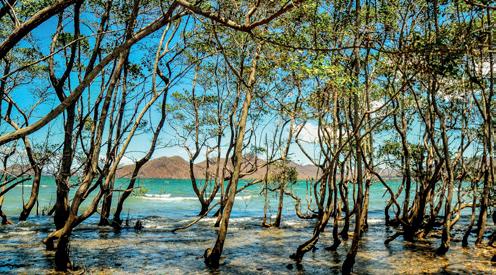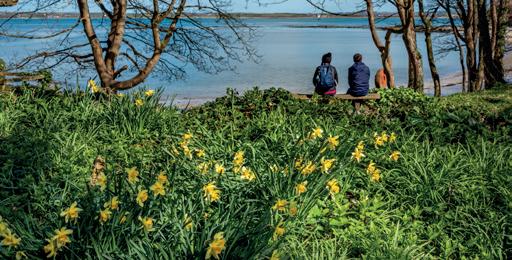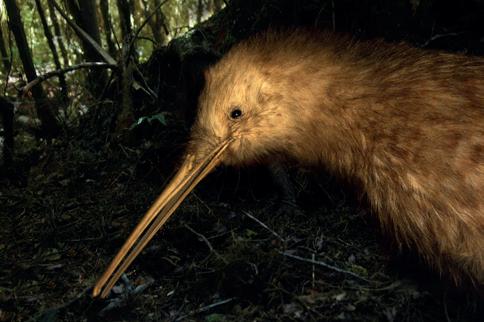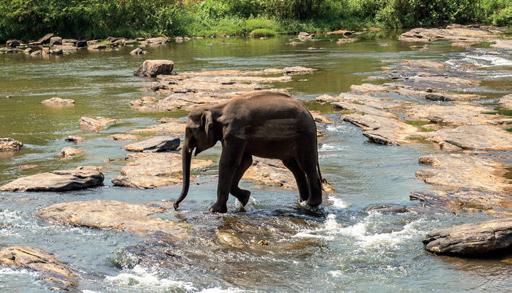
4 minute read
Biodiversity Conservation and Restoration
Visits to national parks, wildlife reserves or other protected natural spaces not only support the protection of nature and encourage local pride, but they also provide funding and an economic incentive for local communities to continue supporting conservation initiatives.

On average, 2.6 national parks, wildlife reserves or other protected natural spaces are visited on every Exodus Travels trip, only 6% of our trips do not include visits to any of these areas.
There are many other ways in which our local network of operator partners is proactively supporting the protection and regeneration of biodiversity through our trips; currently, operators for 70% of our trips say they have policies or practices which proactively support nature conservation and restoration. Here are just a few examples of the ways in which this is being done…
In addition to those highlighted, the yellow points represent the location of a number of other exciting initiatives that are being run or supported by our operators:
Creation of a woodland in North Wales which the team tends, manages regrowth and plants new trees
Cycle to work scheme taken up by nearly all staff in Italy
Educating and promoting better waste management practices especially in regard to river pollution in Albania Engaging and educating our global customers about the problems caused from buying souvenirs that can damage
NAMIBIA support communities and schools in conservation education wildlife (such as corals or wild woods)
Environmental preservation and animal welfare education for young people in partnership with WildAct in Vietnam Fostering and then releasing a baby elephant back into the wild in Sri Lanka Funding native tree and mangrove planting in Botswana , Costa Rica , Italy , Kenya , Namibia , New Zealand , Rwanda , Uganda and Wales enhance
Marsican bear protection in Italy
Predator control services to enhance biodiversity and protect threatened species in New Zealand

Providing or supporting communities and schools in conservation education in Namibia and Romania
Researching and conserving the wildlife and rural heritage of the Rodopi Mountains in Bulgaria
Rubbish clean ups in Italy , Namibia , UK
Saving sausage trees in Botswana

Staff participation in rewilding in Japan
Supporting “Green Life Halong”, Vietnam , a women’s initiative that focuses on turning bricks/old panels into daily use commodities such as bags, wallet and other goods
Supporting Community Based Tourism in Da Bac village, Vietnam , by funding, training and taking clients to experience the homestays and preserving/promoting local culture
Undertaking activities to try to increase customer sustainability behaviour among our suppliers around the world Various donations to conservation and wildlife research projects around the world

Goal:
Measurably Reduce Food Waste Across Our Trips
AREA OF IMPACT: Reduce and mitigatePollution and Waste
PROGRESS: As in 2021, last year, operators for 58% of our trips say they make use of leftover food, either through redistribution to staff, local communities or use for animal feed or compost. Operators for 33% of our trips (up from 18% in 2021) say they avoid food waste altogether by ensuring only what’s needed is prepared.
NEXT STEPS: Our survey showed that 9% of our operators do not have any initiatives in place to reduce food waste. We will continue to work with them over the months ahead, sharing best practices and offering encouragement in this area.
Goal:
ELIMINATE DISTRIBUTION OF ANY SINGLE-USE PLASTICS TO CUSTOMERS ON TRIPS (DIRECT OPERATIONS)
AREA OF IMPACT: Avoid - pollution and waste
PROGRESS: In certain parts of the world, it is very difficult to find suitable alternatives for some single use plastics – particularly water bottles. We do not directly give out any single use plastic products on 94% of our trips.
NEXT STEPS: Our People, Places and Planet Plan initially set the goal of being 100% single-use plastic free by the end of 2022 and we are now at 94%. While total removal is a challenge, we continue to engage with suppliers and customers to influence continued reductions wherever possible.
Goal:
ENGAGE CUSTOMERS WITH REDUCING WASTE ON TRIP
AREA OF IMPACT: Reduce and mitigate - Pollution and Waste
PROGRESS: In 2022, we updated our website communications and all the post-booking information that we send to customers. Our trip notes and Nature First Travel Tips now specifically mention how our customers can help our waste reduction goals.
NEXT STEPS: We will continue to share waste reduction tips and ideas with customers, so we can especially help places with minimal waste facilities.
Goal:
Achieve Zero Waste To Landfill Across Offices
AREA OF IMPACT: Avoid - Pollution and waste
PROGRESS: Our office in Surbiton, near London, houses around 80% of all Exodus Travels’ staff. Here, our staff separate their waste for composting, recycling and into general waste. All general waste left over after recycling is sent to facilities in the UK and northern Europe where it is used as fuel to generate electricity. None of it goes to landfill.
NEXT STEPS: We are working with the landlords of our smaller offices to support similar zero waste to landfill initiatives.
Our us an plastic we offer
SINGLE-USE FOOD OR CONTAINERS
SINGLE-USE PLASTICS ACROSS OUR TRIPS:
Our Supplier Sustainability Survey gives an understanding of levels of single-use plastic across our trips. We want to see how are performing against our goals and offer opportunities for best practice sharing:
90 % OPERATORS ACROSS OF OUR TRIPS
ARE ACTIVELY USING RE-USABLE OR BIODEGRADABLE ALTERNATIVES INSTEAD OF SINGLE-USE PLASTICS, SUCH AS RE-USABLE FOOD CONTAINERS AND BIODEGRADABLE FOOD WRAPPING
(83% IN 2021 AND 60% IN 2020).
94 %
OF OUR TRIPS ARE FREE OF SINGLE-USE PLASTICS (EXCLUDING THOSE PROVIDED IN HOTEL ROOMS)
(UP FROM 82% IN 2021)
SINGLE-USE PLASTIC FOOD WRAPPING OR PLASTIC FOOD CONTAINERS ARE USED ACROSS
5 % OF OUR TRIPS
1 %
SINGLE-USE PLASTIC CUPS OR PLATES ARE USED IN JUST OF OUR TRIPS
1 %
USE OF SINGLEUSE PLASTIC BOTTLES ACROSS OUR TRIPS HAS FALLEN BACK TO THE 2018 LEVELS (DOWN FROM 9% IN THE COVID YEAR OF 2021).
45 %
TRIP NIGHTS SPENT IN ACCOMMODATION THAT SUPPLIES SINGLE-USE TOILETRY BOTTLES
(UP FROM 39% IN 2020)







